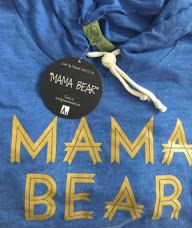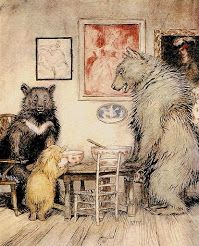MAMA BEAR Fails to Function as a Trademark for Clothing, Says TTAB
The TTAB upheld yet another failure-to-function refusal, this time for the proposed mark MAMA BEAR for various clothing items, including t-shirts and sweatshirts. The Board recited its now-standard litany of f-to-f precedents and concluded that "[u]biquitous use of MAMA BEAR, emblazoned in an ornamental manner on the front of t-shirts and sweatshirts by Applicant and many third parties, supports a finding that the phrase MAMA BEAR will be perceived as a widely used message, and not as a unique source identifier." In re Sarah Marie Duncan d/b/a Loved by Hannah and Eli, Inc., Serial No. 86923714 (February 3, 2021) [not precedential] (Opinion by Judge Jonathan Hudis).
Examining Attorney Steven W. Ferrell Jr. submitted dictionary definitions of MAMA BEAR ("A tough, aggressive, and protective mother. Often going to extreme lengths to protect her child, usually her son, and herself"), usage in literature (THE STORY OF GOLDILOCKS AND THE THREE BEARS) and in media ("The Problem with 'Mama Bear' Syndrome", PARENTING magazine), and third-party uses of MAMA BEAR on clothing (often depicted as being worn by pregnant women).
Applicant pointed to some 19 issued registrations for marks comprising or containing MAMA BEAR for a variety of goods and services. She argued that the USPTO was acting in an inconsistent and arbitrary manner in rejecting her application. Applicant also pointed out that she uses MAMA BEAR in a trademark manner on hangtags, sewn-in labels, packaging, and invoices. The Examining Attorney maintained that MAMA BEAR is a commonplace message or expression that is widely used by a variety of sources, especially when displayed in an ornamental manner on clothing.
The Board observed that the USPTO's policy regarding the registrability of widely used messages is summarized in TMEP § 1202.04(b):
Messages that merely convey ordinary, familiar concepts or sentiments that are used by a variety of sources in the marketplace are considered commonplace and will be understood as conveying the ordinary concept or sentiment normally associated with them, rather than serving any source-indicating function.
As to the registrations cited by Applicant, the Board pointed out
once again that each case must be decided on its own record. In
addition, the registrations (including one owned by Applicant for
IT'S A MAMA BEAR THING) merited little probative value because
the registered marks are distinguishable from the proposed mark.
Moreover, all of the third-party registrations involved goods and
services other than clothing.
Applicant claimed that her use of MAMA BEAR preceded that of the
third-party marks, and that the sellers are vendors who copied her
design. The Board was unmoved: "That Applicant may have been
the first user of the ubiquitous MAMA BEAR designation is not
dispositive on the issue of registrability where, as here, the
evidence shows that the term indeed is ubiquitous."
As the manner of Applicant's use of MAMA BEAR, the Board
noted that this usage was the same as others using the phrase on
clothing. Moreover, Applicant's hang tag contains other words
and designs that appear as trademarks.
The Board found from the evidence of record that
"target consumers who purchase and wear this merchandise
express to others that they exude protective maternal behavior.
MAMA BEAR is therefore a common, widely used and generally
understood term to convey a messages of an ordinary or familiar
concept or sentiment – aggressive protective
parenting."
Consequently, the Board concluded that MAMA BEAR does not serve as a designation of source for Applicant's clothing products and is unregistrable under Sections 1, 2, and 45 of the Lanham Act.
The content of this article is intended to provide a general guide to the subject matter. Specialist advice should be sought about your specific circumstances.


